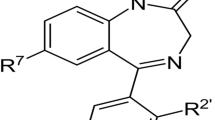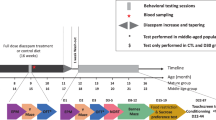Abstract
The short-term effects of benzodiazepines on memory are well established and are suspected in the long term. Eleven studies have been published so far concerning benzodiazepine use and the risk of dementia disorders; nine of these studies concluded these drugs have a deleterious effect, one found a protective effect, and one (the most recently published) observed no effect. The positive association found in some studies could be due to a reverse causation bias since the main indications for benzodiazepines (e.g. sleep disorders, anxiety) can also be prodromes of dementia disorders. This bias is less likely for treatments started more than 10 years before the diagnosis. Among others, three mechanisms could underlie the potential influence of benzodiazepines on the development of dementia disorders. First, benzodiazepines can decrease beta-site amyloid precursor protein-cleaving enzyme 1 (BACE-1) and γ-secretase activity and slow down the accumulation of Aβ oligomers in the brain. This potential positive effect has never been confirmed; the same is true for the prevention of excitotoxicity through benzodiazepine anti-glutamatergic action. Second, since astrocytes located in the area of amyloid plaques could have gamma-aminobutyric acid (GABA)-secreting activity, patients with pre-dementia lesions could be at increased risk of presenting with more pronounced deleterious cognitive effects of benzodiazepines. Finally, owing to the neural compensation and cognitive reserve concepts, some subjects could cope with initial lesions by using/developing alternative networks. By lowering the brain activation level, benzodiazepines could limit this capacity. In conclusion, it is essential that animal studies explore the mechanistic hypotheses of this association found by most of the pharmacoepidemiological studies conducted on this topic.
Similar content being viewed by others
References
Donoghue J, Lader M. Usage of benzodiazepines: a review. Int J Psychiatry Clin Pract. 2010;14:78–87.
Ghoneim MM, Mewaldt SP. Benzodiazepines and human memory: a review. Anesthesiology. 1990;72(5):926–38.
Curran HV. Tranquillising memories: a review of the effects of benzodiazepines on human memory. Biol Psychol. 1986;23(2):179–213.
Puustinen J, Nurminen J, Vahlberg T, Lyles A, Isoaho R, Raiha I, et al. CNS medications as predictors of precipitous cognitive decline in the cognitively disabled aged: a longitudinal population-based study. Dement Geriatr Cogn Dis Extra. 2012;2(1):57–68.
Paterniti S, Dufouil C, Alperovitch A. Long-term benzodiazepine use and cognitive decline in the elderly: the Epidemiology of Vascular Aging Study. J Clin Psychopharmacol. 2002;22(3):285–93.
Bierman EJ, Comijs HC, Gundy CM, Sonnenberg C, Jonker C, Beekman AT. The effect of chronic benzodiazepine use on cognitive functioning in older persons: good, bad or indifferent? Int J Geriatr Psychiatry. 2007;22(12):1194–200.
Barker MJ, Greenwood KM, Jackson M, Crowe SF. Cognitive effects of long-term benzodiazepine use: a meta-analysis. CNS Drugs. 2004;18(1):37–48.
Neutel CI. The epidemiology of long-term benzodiazepine use. Int Rev Psychiatry. 2005;17(3):189–97.
Egan M, Moride Y, Wolfson C, Monette J. Long-term continuous use of benzodiazepines by older adults in Quebec: prevalence, incidence and risk factors. J Am Geriatr Soc. 2000;48(7):811–6.
Taragano FE, Allegri RF, Krupitzki H, Sarasola DR, Serrano CM, Lon L, et al. Mild behavioral impairment and risk of dementia: a prospective cohort study of 358 patients. J Clin Psychiatry. 2009;70(4):584–92.
Rosenberg PB, Mielke MM, Appleby B, Oh E, Leoutsakos JM, Lyketsos CG. Neuropsychiatric symptoms in MCI subtypes: the importance of executive dysfunction. Int J Geriatr Psychiatry. 2011;26(4):364–72.
Lyketsos CG, Lopez O, Jones B, Fitzpatrick AL, Breitner J, DeKosky S. Prevalence of neuropsychiatric symptoms in dementia and mild cognitive impairment: results from the cardiovascular health study. JAMA. 2002;288(12):1475–83.
Wu CS, Wang SC, Chang IS, Lin KM. The association between dementia and long-term use of benzodiazepine in the elderly: nested case-control study using claims data. Am J Geriatr Psychiatry. 2009;17(7):614–20.
Wu CS, Ting TT, Wang SC, Chang IS, Lin KM. Effect of benzodiazepine discontinuation on dementia risk. Am J Geriatr Psychiatry. 2011;19(2):151–9.
Lagnaoui R, Tournier M, Moride Y, Wolfson C, Ducruet T, Begaud B, et al. The risk of cognitive impairment in older community-dwelling women after benzodiazepine use. Age Ageing. 2009;38(2):226–8.
Lagnaoui R, Begaud B, Moore N, Chaslerie A, Fourrier A, Letenneur L, et al. Benzodiazepine use and risk of dementia: a nested case-control study. J Clin Epidemiol. 2002;55(3):314–8.
Gallacher J, Elwood P, Pickering J, Bayer A, Fish M, Ben-Shlomo Y. Benzodiazepine use and risk of dementia: evidence from the Caerphilly Prospective Study (CaPS). J Epidemiol Community Health. 2011;66(10):869–73.
Chen PL, Lee WJ, Sun WZ, Oyang YJ, Fuh JL. Risk of dementia in patients with insomnia and long-term use of hypnotics: a population-based retrospective cohort study. PloS One. 2012;7(11):e49113.
Billioti de Gage S, Moride Y, Ducruet T, Kurth T, Verdoux H, Tournier M, et al. Benzodiazepine use and risk of Alzheimer’s disease: case–control study. BMJ. 2014;349:g5205.
Billioti de Gage S, Begaud B, Bazin F, Verdoux H, Dartigues JF, Peres K, et al. Benzodiazepine use and risk of dementia: prospective population based study. BMJ. 2012;345:e6231.
Imfeld P, Bodmer M, Jick SS, Meier CR. Benzodiazepine use and risk of developing Alzheimer’s disease or vascular dementia: a case-control analysis. Drug Saf. 2015;38(10):909–19.
Fastbom J, Forsell Y, Winblad B. Benzodiazepines may have protective effects against Alzheimer disease. Alzheimer Dis Assoc Disord. 1998;12(1):14–7.
Fish M, Bayer AJ, Gallacher JE, Bell T, Pickering J, Pedro S, et al. Prevalence and pattern of cognitive impairment in a community cohort of men in South Wales: methodology and findings from the Caerphilly Prospective Study. Neuroepidemiology. 2008;30(1):25–33.
Kang JE, Lim MM, Bateman RJ, Lee JJ, Smyth LP, Cirrito JR, et al. Amyloid-beta dynamics are regulated by orexin and the sleep-wake cycle. Science. 2009;326(5955):1005–7.
Mintzer MZ, Kuwabara H, Alexander M, Brasic JR, Ye W, Ernst M, et al. Dose effects of triazolam on brain activity during episodic memory encoding: a PET study. Psychopharmacology. 2006;188(4):445–61.
Mintzer MZ, Griffiths RR, Contoreggi C, Kimes AS, London ED, Ernst M. Effects of triazolam on brain activity during episodic memory encoding: a PET study. Neuropsychopharmacology. 2001;25(5):744–56.
Sperling R, Greve D, Dale A, Killiany R, Holmes J, Rosas HD, et al. Functional MRI detection of pharmacologically induced memory impairment. Proc Natl Acad Sci USA. 2002;99(1):455–60.
Churcher I, Ashton K, Butcher JW, Clarke EE, Harrison T, Lewis HD, et al. A new series of potent benzodiazepine gamma-secretase inhibitors. Bioorg Med Chem Lett. 2003;13(2):179–83.
Imbimbo BP, Giardina GA. Gamma-secretase inhibitors and modulators for the treatment of Alzheimer’s disease: disappointments and hopes. Curr Top Med Chem. 2011;11(12):1555–70.
Doody RS, Raman R, Farlow M, Iwatsubo T, Vellas B, Joffe S, et al. A phase 3 trial of semagacestat for treatment of Alzheimer’s disease. N Engl J Med. 2013;369(4):341–50.
May PC, Robison PM. GYKI 52466 protects against non-NMDA receptor-mediated excitotoxicity in primary rat hippocampal cultures. Neurosci Lett. 1993;152(1–2):169–72.
O’Brien JL, O’Keefe KM, LaViolette PS, DeLuca AN, Blacker D, Dickerson BC, et al. Longitudinal fMRI in elderly reveals loss of hippocampal activation with clinical decline. Neurology. 2010;74(24):1969–76.
Hamalainen A, Pihlajamaki M, Tanila H, Hanninen T, Niskanen E, Tervo S, et al. Increased fMRI responses during encoding in mild cognitive impairment. Neurobiol Aging. 2007;28(12):1889–903.
Jo S, Yarishkin O, Hwang YJ, Chun YE, Park M, Woo DH, et al. GABA from reactive astrocytes impairs memory in mouse models of Alzheimer’s disease. Nat Med. 2014;20(8):886–96.
Martinez-Cue C, Martinez P, Rueda N, Vidal R, Garcia S, Vidal V, et al. Reducing GABAA alpha5 receptor-mediated inhibition rescues functional and neuromorphological deficits in a mouse model of down syndrome. J Neurosci. 2013;33(9):3953–66.
Hatayama Y, Hashimoto T, Kohayakawa H, Kiyoshi T, Nakamichi K, Kinoshita T, et al. In vivo pharmacological characterization of AC-3933, a benzodiazepine receptor partial inverse agonist for the treatment of Alzheimer’s disease. Neuroscience. 2014;265:217–25.
Author information
Authors and Affiliations
Corresponding author
Ethics declarations
Funding
The authors have received no public or private funding for this manuscript.
Conflict of interest
Antoine Pariente, Sophie Billioti de Gage, Nicholas Moore and Bernard Bégaud declare no conflicts of interest implying collaboration with private companies relevant to the subject discussed.
All authors have contributed in the past years to publically funded pharmacoepidemiological studies that found an association between use of benzodiazepines and an increased risk of developing dementia disorders in the elderly.
Rights and permissions
About this article
Cite this article
Pariente, A., de Gage, S.B., Moore, N. et al. The Benzodiazepine–Dementia Disorders Link: Current State of Knowledge. CNS Drugs 30, 1–7 (2016). https://doi.org/10.1007/s40263-015-0305-4
Published:
Issue Date:
DOI: https://doi.org/10.1007/s40263-015-0305-4




